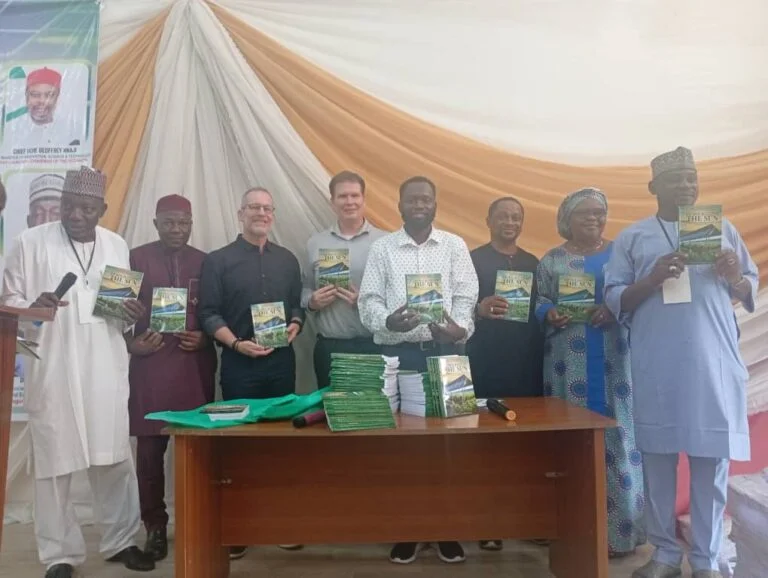Minister of Innovation, Science and Technology, Chief Uche Nnaji, says the Federal Government remains dedicated to promoting agrivoltaic farming as a means to enhance food and energy production across Nigeria.
He made this known on Tuesday in Abuja at the maiden International Agrivoltaics Workshop and official unveiling of the book Democratising the Sun: Agrivoltaics and the Future of Farming in Nigeria and Africa.
According to StarReporters correspondents, agrivoltaic farming, also called agrisolar, is the practice of integrating solar panels with agricultural land use by growing crops beneath or around solar infrastructure, thereby enabling dual food and energy production.
The event was organised by Lichipu for Food, Energy and Water Sustainability (LIFEWS) Foundation in partnership with the University of Abuja, with technical support from Oregon State University researchers in the U.S.
The theme of the workshop was Agrivoltaics and Climate-Resilient Agriculture in Nigeria and Africa: Scaling Innovations for Food, Energy, Water Security, and the Common Good.
The minister, represented by his Special Assistant on Project Delivery, Monitoring and Evaluation, Dr Ezebuiro Christ Peace, said the event reflected the kind of climate-smart, community-driven innovation that lies at the core of the ministry’s national transformation agenda.
He explained that the Ministry of Innovation, Science and Technology is committed to transitioning Nigeria to a diversified, knowledge-based economy driven by local innovation.
“We aim to harness indigenous capacity, promote green industrialisation and enable technologies that improve lives.
Agrivoltaics, the combination of solar energy harvesting and agricultural productivity, stands as a model solution that demonstrates how we can optimise land use, generate clean energy, ensure food security and build a resilient climate for everyone,” he said.
The minister noted that despite Nigeria’s abundance of sunlight and agricultural resources, challenges around energy access and food insecurity persist, and agrivoltaics could help address these issues—especially in expanding off-grid solar systems in farming communities.
He added that agrivoltaics can improve crop yields by creating moderated microclimates, reducing water loss through evapotranspiration, and enhancing water efficiency.
“This aligns with the Ministry’s vision of deploying science, innovation and technology for national competitiveness, rural transformation and environmental sustainability,” he said.
Speaking on the newly launched book, the minister described it as symbolic, saying its title reflects the broader mission of making solar energy accessible to all.
“Sunlight, the most democratic of all energy sources, should not remain the privilege of a few.
Knowledge like sunlight must be shared, localised and used for common good,” he said.
He congratulated the book’s authors and commended the collaborative efforts of LIFEWS Foundation, the University of Abuja, and Oregon State University in bringing agrivoltaics to Nigeria.
He noted that the Ministry is already supporting agrivoltaic demonstration projects and has incorporated crop production into solar energy generation at several locations nationwide.
“The dimension presented here offers new opportunities for entrepreneurship and policy development.
We are also collaborating with tertiary institutions to drive science, technology and innovation-led community impact focused on solar energy, food systems and related areas,” he said.
He disclosed that efforts are underway to promote the local development and manufacture of solar farming technology, with the hope that Nigeria will begin producing its own solar panels in the coming months.
“The Ministry values international partnerships that empower local solutions.
The involvement of Oregon State University reflects the kind of south-north collaboration we encourage, mutually beneficial, inclusive and grounded in real-world impacts,” he added.
The minister stressed that innovation must go beyond laboratories and conferences to reach farms, schools, homes, and markets, assuring stakeholders of the Ministry’s continued support for scalable, climate-smart innovations such as agrivoltaics.
“Let us grow the food that we need, generate the energy that we need to grow that food, and that will enhance the hope of Nigerians,” he said.
In his remarks, Mr Gabriel Ayayia, Founder of LIFEWS Foundation and author of the book, said agrivoltaic farming was introduced as a new model to promote food sovereignty in Nigeria.
“What we are promoting today is a new way of farming, which is climate-smart agriculture. Instead of farming the traditional way, we are reimagining agricultural practices.
This technology is all about integrating solar into farming,” he said.
He noted that the concept focuses on land ownership and collective responsibility in food production, with affordability being a major concern.
“When it comes to affordability, that is why this technology is founded on leadership—let’s do it together.
We cannot talk about food, energy or water insecurity without involving all stakeholders. We need everyone to be part of this innovation,” he said.
Ayayia said the foundation would begin awareness campaigns to scale the technology to rural communities and expressed optimism that local solar panel production would make the innovation more affordable.
Also speaking, Dr Chad Higgins, agrivoltaics expert from Oregon State University, emphasised the sun’s critical role in plant growth.
“The sun is a critical resource that must be managed.
It shines on every land. It is a generous resource that we can use and take a portion of it,” he said.
(NAN)


